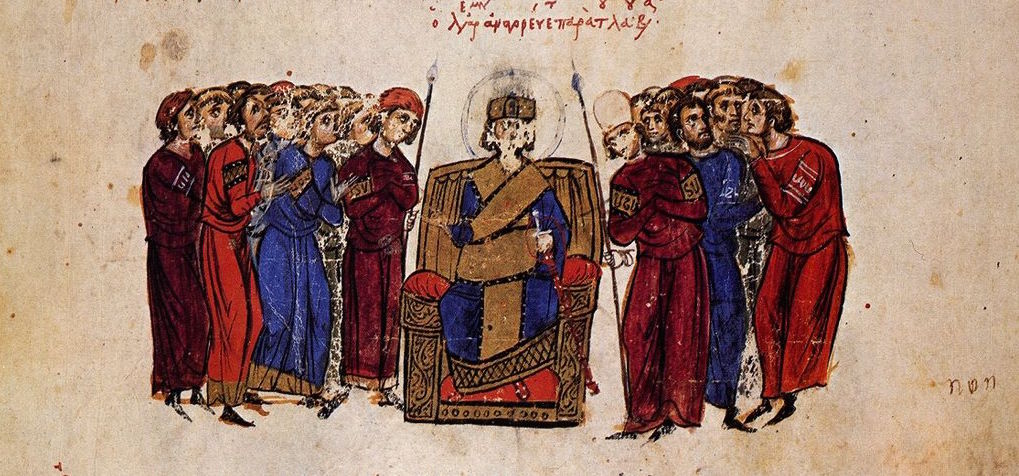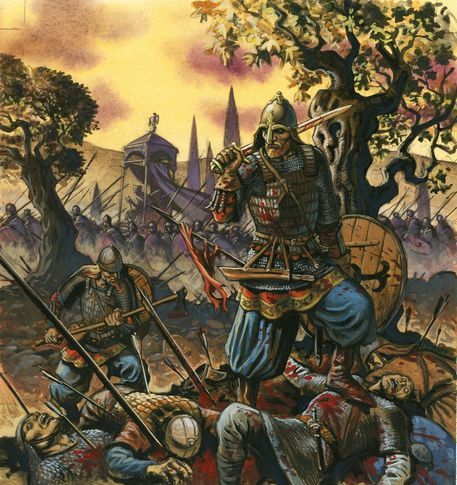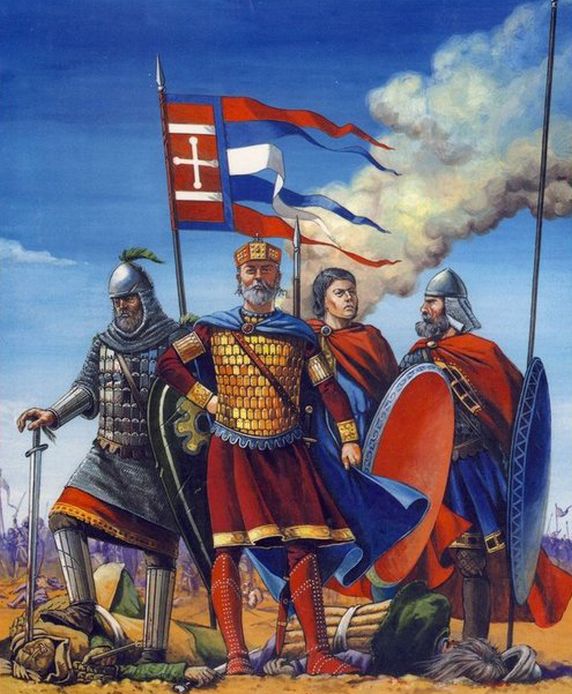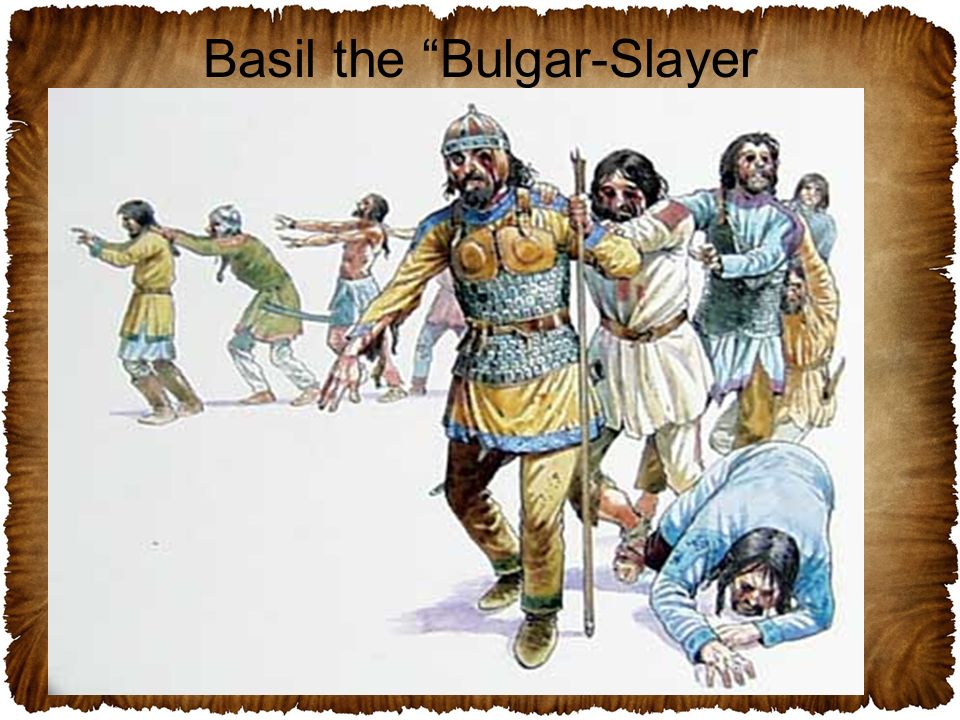| Author |
Message |
 |
|
|
 |
|
Advert
|
Forum adverts like this one are shown to any user who is not logged in. Join us by filling out a tiny 3 field form and you will get your own, free, dakka user account which gives a good range of benefits to you:
- No adverts like this in the forums anymore.
- Times and dates in your local timezone.
- Full tracking of what you have read so you can skip to your first unread post, easily see what has changed since you last logged in, and easily see what is new at a glance.
- Email notifications for threads you want to watch closely.
- Being a part of the oldest wargaming community on the net.
If you are already a member then feel free to login now. |
|
 |
![[Post New]](/s/i/i.gif) 2018/05/13 11:48:47
Subject: The Downfall of Leo V the Armenian
|
 |

Stubborn Hammerer
Sweden
|

Byzantine (Mediaeval Eastern Roman) emperor Leo V (r. 813-820) has been deemed too clever by half by some students of history.
First he toppled the inept reigning emperor Michael I Rangabe by withdrawing his troops in the middle of an open field battle at Versinikia against the Bulgars, a battle that the Byzantines were in the process of winning (for similar reasons of organization and drill that made the ancient Romans excel at open field battles against foes such as Celts, Iberians and Germans). This resulted in a great slaughter of Constantinople's army, whereupon Michael I resigned voluntarily, Leo seized power and had all Michaels' sons gelded. The triumphant Bulgar army marched to Constantinople, sacrificing in full view of the city walls and demanding negotiations. The Bulgar Khan Krum entered into a meeting with Leo V, but spotted a sign that betrayed how Leo had filled his retinue with assassins. The attempt at the Khan's life was botched, and fleeing slightly wounded back to his host, the enraged Khan burnt Constantinople's suburbs, massacred populations across the southern Balkans and ravaged Byzantine lands. Some years of external peace and internal iconoclasm then followed.
In 820, Leo had his former friend and military commander Michael the Amorian arrested on treason charges. Instead of just executing Michael swiftly, Leo concocted a scheme where Michael was to be tied to an ape and cast into a bathhouse furnace, to be either maimed by the monkey or die from burning or dehydration under the heated bathhouse floor. However Christmas got in the way, and Leo delayed with Michael's punishment until after Christmas, whereupon Michael's supporters gathered and assassinated Leo V.
Then Michael II ascended the throne as a man who was not tied to an ape and cast into a furnace.
|
|
This message was edited 2 times. Last update was at 2018/05/13 19:51:27
|
|
|
 |
 |
![[Post New]](/s/i/i.gif) 2018/05/13 12:38:37
Subject: Re:The Downfall of Leo V the Armenian
|
 |

[MOD]
Anti-piracy Officer
Somewhere in south-central England.
|
Before TV was invented people had to make their own entertainment...
It's history like this that makes me not bother to read fantasy fiction any more. Whatever weird stuff authors come up with it barely rivals the things history has already presented.
|
|
|
|
 |
 |
![[Post New]](/s/i/i.gif) 2018/05/13 15:00:41
Subject: The Downfall of Leo V the Armenian
|
 |

Highlord with a Blackstone Fortress
Adrift within the vortex of my imagination.
|
Byzantines believed in subtlety so much they forgot how to employ it.
|
n'oublie jamais - It appears I now have to highlight this again.
It is by tea alone I set my mind in motion. By the juice of the brew my thoughts aquire speed, my mind becomes strained, the strain becomes a warning. It is by tea alone I set my mind in motion. |
|
|
 |
 |
![[Post New]](/s/i/i.gif) 2018/05/13 19:56:26
Subject: The Downfall of Leo V the Armenian
|
 |

Stubborn Hammerer
Sweden
|
@Kilkrazy: Indeed! However, Ian Watson's novel Space Marine contains some high calibre bonkers scenes that may make it worth a read even so (if one can stomach the toilet humour). There aren't much else that comes to mind from all I've read. Even Tolkien's masterful fiction is at the end of the day echoes of real history and real-world mythology and folklore, and most else are pale shadows of Tolkien.
Still, fictive stories aside, few things beat settings like Warhammer 40'000. They may not deliver the convoluted plots that real history serves, but they do deliver a weird world to explore in the imagination (meaning not novels).
|
|
|
|
 |
 |
![[Post New]](/s/i/i.gif) 2018/05/14 03:28:10
Subject: Re:The Downfall of Leo V the Armenian
|
 |

[DCM]
Savage Minotaur
Baltimore, Maryland
|
Ha! Just got past this dude on the History of Byzantium podcast, that picked up after the seminal History of Rome.
Byzantine history is now my favorite era! I totally didn’t know that the Byzantines called themselves Roman(or the greek word for it.) The life of Emperess Irene alone would make a great, dark, intriguing TV show.
So much history is never taught in the western world unless you specialize in it.
All my life I thought that once Rome fell in the west, they decided to call themselves Byzantine or some such. Turned out that was a western term for them created long after their fall or some such.
Also didn’t know that the Bulgars were such badasses. Going to hit up the History of Bulgaria podcast once I dinish Byzantium, then onto the Ottomans.
|
"Sometimes the only victory possible is to keep your opponent from winning." - The Emperor, from The Outcast Dead.
"Tell your gods we are coming for them, and that their realms will burn as ours did." -Thostos Bladestorm
|
|
|
 |
 |
![[Post New]](/s/i/i.gif) 2018/05/14 06:58:54
Subject: Re:The Downfall of Leo V the Armenian
|
 |

Stubborn Hammerer
Sweden
|
Yup, the Roman realm that began as an Italic town which conquered most of the known world lasted all the way up until 1453, against repeatedly terrible odds. They were always Romans to themselves, and Romans to their eastern neighbours. Persian, Arabic and Turkish words for Byzantium were all variations of Rum, with the European Greek lands under Ottoman conrol being called Rumeli and the Greek Orthodox Christian population being the Rum millet, headed by the Patriarch of Constantinople, answerable to the Sultan. The eastern Roman identity lasted all the way up to the early 20th century, when people living on some Greek isles were asked by Greek mainlander troops who they were. "Romans," they answered, but they were told instead that they were Hellenes.
The history of Byzantium gives a whole new ring to the term Graeco-Roman, doesn't it? The ancient mediterranean civilization surviving hordes upon hordes of enemies, ravages and depopulation, clawing itself back into shape and reconquest time and time again, only to have their efforts smashed: The boulder of Sisyphus rolls down the slope again as plague, raids, military disasters and new invasions hit home.

They got lucky sometimes, and could trust in the Theodosian walls of Constantinople and in Greek fire to keep the nerve center of the empire intact up to the fourth crusade. Sometimes the power of gold was enough to stave off threats, or to draw mercenaries from far and wide to their service. Their many scattered coastal holdings could be resupplied and reinforced by the Roman navy, and for a long time they could fend off superior foes in the east by upholding a frontier at the Taurus mountains. Byzantine history is full of clever strategy and it has got its share of diplomatic brilliance ("my enemy's enemy is my friend") and military success, but ultimately the medieval Romans couldn't afford to wage war on more fronts than two: One front where they could have an offensive going, and another front where a decent defense could be mounted. They would often find themselves attacked on at least three or four fronts simultaneously.

Check out Nicephorus I, the Roman emperor who was made into a Bulgar drinking cup after the disastrous battle of Pliska in 811.

Say what one like about the whimpering last centuries of Byzantium, but the last ruler of the Roman empire went out with a bang worthy of the Roman name.
|
|
This message was edited 10 times. Last update was at 2018/05/14 07:10:27
|
|
|
 |
 |
![[Post New]](/s/i/i.gif) 2018/05/15 16:13:35
Subject: Re:The Downfall of Leo V the Armenian
|
 |

Pragmatic Primus Commanding Cult Forces
|
Yeah, the later history of the Roman Empire is basically one big lesson in how incompetence and internal strife can bring down even the mightiest of empires. Late Roman generals were generally more interested in fighting each other for political power than in fighting external enemies. It brought about the fall of the Western half, and a thousand years later the almost exact same causes led to the fall of the Eastern half as well.
That is not to say that the late Roman Empire did not have its brilliant emperors, military geniuses and great successes as well. They had some extremely competent leaders that succeeded in revitalising the empire for a while, until the good leader died and they started fighting each other again, and decline continued.
|
Error 404: Interesting signature not found
     |
|
|
 |
 |
![[Post New]](/s/i/i.gif) 2018/05/18 22:58:11
Subject: The Downfall of Leo V the Armenian
|
 |

Stubborn Hammerer
Sweden
|
Indeed!
Romans had a penchant for punishing people with animals. In the east, they developed a fondness for mutilating defeated rival noblemen via cutting off noses, tongues, male genitalia and eyes. It was seen as more humane than killing someone outright, and likewise you were not eligible for the imperial throne if you were physically imperfect ( with one exception). You won't be surprised to hear that most adult men didn't long survive their castration, and many died from blinding as well. That Roman cruelty was alive and well right up to the very end in 1453.
 Basil II
Basil II took the blinding custom to extremes against the Bulgars after the battle of Kleidion:


It was a different time. One Thracesian woman was raped by a Varangian guardsman, and proceeded to spear him to death, whereupon the dead man's comrades sought out the woman and gave her the dead man's belongings, as per custom:

|
|
|
|
 |
 |
|
|